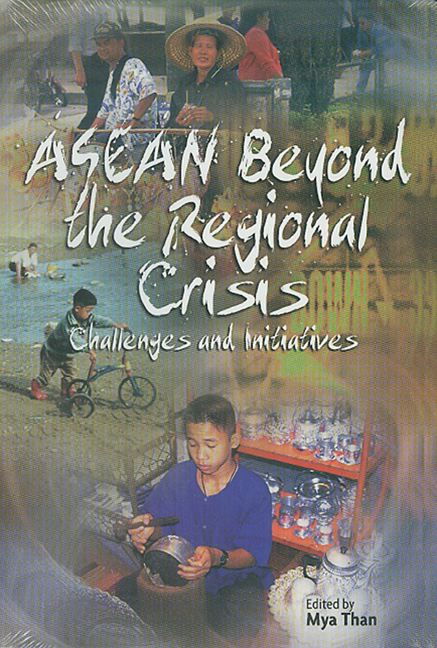Book contents
- Frontmatter
- Contents
- List of Tables
- List of Figures
- Glossary
- Contributors
- 1 ASEAN Beyond the Crisis: A Bird's-eye View
- 2 East Asia: Crisis and Recovery
- 3 Competitiveness and Sustainable Growth in ASEAN
- 4 ASEAN Free Trade Area: Progress and Challenges
- 5 ASEAN Investment Area: Progress and Challenges
- 6 Financial and Macroeconomic Co-operation in ASEAN: Issues and Policy Initiatives
- 7 Food Security in ASEAN
- 8 ASEAN Co-operation and the Environment
- 9 ASEAN and the International Trading System: Regional Trade Arrangement vs. the WTO
- 10 ASEAN and Its Inter-Regional Economic Links
- Appendix I ASEAN's Relevance: Has It Become Questionable?
- Appendix II Is ASEAN Still Relevant? Some Thoughts from a European Perspective
- Index
Appendix I - ASEAN's Relevance: Has It Become Questionable?
Published online by Cambridge University Press: 03 November 2017
- Frontmatter
- Contents
- List of Tables
- List of Figures
- Glossary
- Contributors
- 1 ASEAN Beyond the Crisis: A Bird's-eye View
- 2 East Asia: Crisis and Recovery
- 3 Competitiveness and Sustainable Growth in ASEAN
- 4 ASEAN Free Trade Area: Progress and Challenges
- 5 ASEAN Investment Area: Progress and Challenges
- 6 Financial and Macroeconomic Co-operation in ASEAN: Issues and Policy Initiatives
- 7 Food Security in ASEAN
- 8 ASEAN Co-operation and the Environment
- 9 ASEAN and the International Trading System: Regional Trade Arrangement vs. the WTO
- 10 ASEAN and Its Inter-Regional Economic Links
- Appendix I ASEAN's Relevance: Has It Become Questionable?
- Appendix II Is ASEAN Still Relevant? Some Thoughts from a European Perspective
- Index
Summary
Has ASEAN's relevance become questionable? Perhaps this question can be answered promptly by saying that ASEAN is still very relevant in the field of politics and conventional security, to moderate political and security disagreements among members. It seems, however, to be less relevant in the field of economics.
ASEAN's Major Objectives
ASEAN's major goals as set out in the ASEAN Declaration in Bangkok on 8 August 1967 were, first, to reconcile intra-regional strife which characterized Southeast Asia at the time (in the form of border and territorial disputes, ethnic conflicts and animosities, religious prejudices, and the fear by smaller states of the bigger states). The second was to manage those conflicts and tensions and create a Southeast Asian regional order on the basis of the social and economic systems of each member country and the territorial status quo, and thus to “promote regional peace and stability”. Both goals were to be achieved by way of a third goal, which was to speed up “the economic growth, social progress and cultural development in the region”. ASEAN's founding fathers were confident that economic and societal development, on the one hand, and peace and stability on the other, were tightly linked. They were further determined, and the fourth goal was “to ensure their stability and security from external interference in any form or manifestation” to “preserve their national identities in accordance with the ideals and aspirations of their peoples”.
ASEAN was thus the result of its members’ recognition of their inability to solve their disputes and conflicts bilaterally. On the other hand, it was also meant to serve as a political-cum-security framework.
These four major goals of regional endeavours in Southeast Asia were subsequently cast into four instruments for political and security building: the ASEAN Declaration; the Declaration on the Zone of Peace, Freedom and Neutrality (ZOPFAN), which was primarily meant to secure the recognition and respect for Southeast Asia as such a zone; the Bali Concord; and ZOPFAN's legal instruments, the Treaty of Amity and Co-operation (TAC) in Southeast Asia and the Treaty on Southeast as a Nuclear Weapon- Free Zone, which was meant to promote perpetual peace, everlasting amity and co-operation among the Southeast Asian nations. These instruments formalized ASEAN's role as an important contributor for peace and stability.
- Type
- Chapter
- Information
- ASEAN Beyond the Regional CrisisChallenges and Initiatives, pp. 274 - 282Publisher: ISEAS–Yusof Ishak InstitutePrint publication year: 2001



